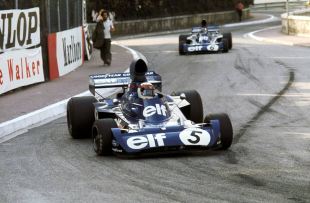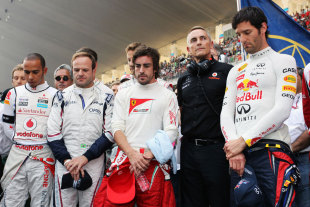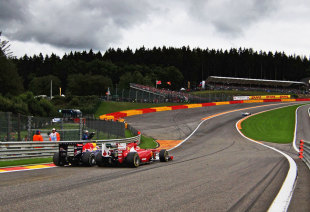After the tragic events in IndyCar in 2011, Sir Jackie Stewart believes Formula One has had a wake-up call

- Drivers:
- Jackie Stewart
As a pioneer for safety throughout his career and beyond, Sir Jackie Stewart has never been short of an opinion when it comes to moving the sport forward. Having raced at a time when serious accidents were all too frequent - famously being helped by Graham Hill at Spa in 1966 after Hill abandoned his own car having spotted Stewart trapped in his off the track - he's seen standards improve, but he's also witnessed very avoidable incidents take place.
In Formula One death used to be a lot more commonplace than it is now. It may seem like a natural statement to make as the sport learns from experience and advancements in technology are made, but too many deaths were the result of safety oversights. Helmuth Koinigg was killed in the 1974 United States Grand Prix - a year after Stewart retired - as a result of a poorly installed safety barrier, while the drivers wanted to boycott the Spanish Grand Prix a year later due to the state of the circuit.
It's true that there have been a number of deaths in IndyCar - seven to be exact - since Ayrton Senna was killed at Imola, but none shook the paddock more than Dan Wheldon's accident at Las Vegas in October.
While the fact that Jenson Button and Anthony Davidson both knew Wheldon well played a major part, with the trio's junior careers intertwining closely, it was also the first death in a race situation in IndyCar for 12 years. A large television audience had tuned in to see a championship showdown, but instead it was tragedy that unfolded before them, and Stewart feels that it displayed the dangers of open-wheel racing to a generation of drivers in Formula One who may have started to become complacent.
"I would say that because everybody's got off with it for so many years now - and it wasn't happening three to five years ago - but it's happened more in the last 12 to 18 months, that we see [drivers more willing to have a collision]," Stewart told ESPNF1 recently. "Because somehow or other everybody's got off with it without anything truly nasty happening.

"The Dan Wheldon crash I think told everybody 'Do you understand the dynamics of a motor racing accident? And do you understand that interlocking wheels is what caused that?' The whole melee was caused by interlocking wheels, and his particular launch may not have been the interlocking wheel but it probably was part of it."
Having survived a time when fatal accidents were all too frequent, Stewart is well aware of the impact of such an occurrence. In his autobiography Winning is Not Enough, Stewart recalls the losses of Jim Clark, Jochen Rindt and Francois Cevert. But even before the first of those - Clark - had gone, Stewart was already campaigning for better safety. In fact, on the day of Clark's death Stewart was carrying out a safety inspection at Jarama instead of racing himself at either Hockenheim or Brands Hatch.
Heavy crashes have not been uncommon in Formula One recently; Sergio Perez's in Monaco springs to mind in 2011 while it still amazes that Mark Webber walked away from his accident in Valencia the previous year. But according to Stewart it's exactly these instances that had been leading drivers to become more complacent, and he points to examples from everyday life to show that when you take risks eventually one will prove costly.
"Now suddenly there was a wakeup call. Unfortunately I've said from time to time that the law of averages tell you that sooner or later you have a plane crash because of the millions of miles that are flown without crashes. You have bus crashes, you have train crashes and you have ferries that sink for no good reason. But you've taken the liberty for whatever reason of filling the ferry with too many people and somebody's overconfidence suddenly caused a tragedy. Now that's just law of averages, you don't see a ferry sinking very often do you?
"They're working every day in Sydney harbour, they're working every day in New York, and they're working every day in all sorts of cities, but if you take liberties and one sinks people die. And I think we in Formula One have become a little too overconfident - our record is unbelievable; seventeen years, eight months and today (December 14) ten days since Ayrton died. I mean what a record of risk management. But at the end of the day the biggest responsibility is actually in the hands of the drivers."

It's not that Stewart doesn't want to see close, on-the-edge racing, far from it. In fact one of his highlights of the 2011 season comes in the shape of a daring high-speed overtaking move at one of the most notorious corners on the calendar, as two drivers took the aforementioned responsibility very seriously.
"Mark Webber's pass on Alonso through Eau Rouge was an example of when a grand prix driver has really come of age, racing against another grand prix driver that he has sufficient confidence in. And Alonso would have to be given the credit for being someone that Mark Webber had such trust and confidence in - because trust and confidence is not always the same thing - to be able to execute that manoeuvre, and it was the manoeuvre of the year for me."
While Stewart looks to the drivers to avoid an accident, he feels it's down to the sport to ensure that it analysis every incident in every category to avoid the worst consequences. If Formula One is to continue boasting such an excellent safety record then lessons need to continue to be learned, ensuring changes are made proactively rather than reactively.
"If you look at all of the realities of life and then you see what we've done as a sport to put ourselves in order and secure the long term viability of the sport [we must do more] because believe me, if the Dan Wheldon accident had happened at a Formula One circuit that car would have been in the crowd. The height of an IndyCar debris fence is different; they have tracks where there is an overhang over the track to stop wheels and parts of cars, or even cars, from getting over the fence. So we've got to be realistic about how we go about that. It costs money but it would cost more money for the wrong accident to happen."
Sir Jackie Stewart is an honorary president of the Springfield Youth Club - Motor Racing's Club for Young People

